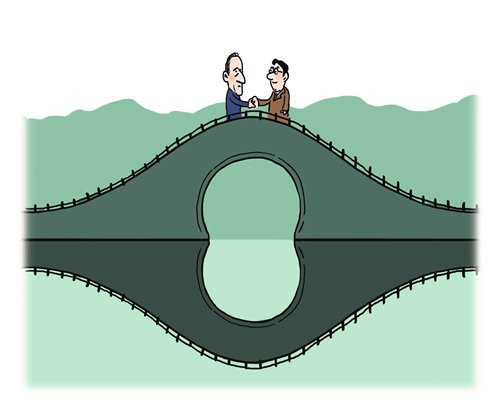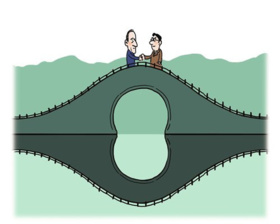By Yi Fan Source:Global Times, People’s Daily
Illustration: Liu Rui/GT
In a few days' time, Chinese President Xi Jinping will be hosting US President Barack Obama on the latter's last trip to China as US president, for the G20 Hangzhou Summit. In the context of the challenging atmosphere for China-US relations in recent months and the heated presidential campaign in the US, this Xi-Obama meeting, the ninth since 2013, will be keenly watched around the world.
Obama started his China relationship on a high note by visiting China in 2009, becoming the first US president in history to pay a state visit to China within his first year in office. His oft-repeated remarks that the US welcomes "a strong, prosperous, and successful China that plays an even greater role on the world stage" resonated well among the Chinese audience at the time.
A high point in China-US relations was reached in 2013 at the Sunnylands meeting, where the two presidents had an unprecedented eight-hour meeting. The meeting yielded an important common understanding on what the Chinese side repeatedly described as building a new model of major country relationship featuring no conflict, no confrontation, mutual respect and win-win cooperation, with a view to establish a generally stable strategic framework for one of the most consequential bilateral relationship for the 21st century.
Such top-level meetings, including similar ones at Yingtai and Blair House, advanced shared interests, effectively managed differences, and catalyzed bilateral cooperation in all areas.
Bilateral trade, two-way investment and people-to-people links flourished. US export to China almost doubled since 2008. In 2015, China became the biggest trading partner of the US for the first time in recent history, and 4.75 million visits were made between the two countries.
The two sides worked closely on international issues, from setting up a G20 summit mechanism in the deep winter of the 2008 financial crisis, to jointly fighting Ebola crisis, working on hotspot issues like the Iranian nuclear issue and Korean Peninsula nuclear issue. Climate change and cyber issues, long major irritants, have been turned into areas of cooperation. Even in military-to-military relations, two confidence-building mechanisms were set up on mutual notification of major military operations and on rules of behavior for the safety of air and maritime encounter.
Alongside this progress, however, Obama's signature policy, the Asia-Pacific rebalancing strategy, has also coincided with some turbulent times in China-US relations. The strategy has gone seriously astray by espousing a heavy military focus and explicitly targeting China.
For example, the US is intent on exploiting the South China Sea issue to peddle the "China threat," strengthen military relationships with regional countries like Japan, the Philippines and Singapore, and instigate unilateral arbitration against China. US military vessels and aircraft sailed and flew provocatively close to Chinese islands and reefs, creating dangerous risks. In Northeast Asia, US plans to deploy THAAD in South Korea have exacerbated strategic tensions.
Underlying these tensions have been profound shifts in the balance of strength between the two countries and the larger international landscape since the beginning of the Obama presidency.
The 2008 global financial crisis not only dealt a blow to the US-led Western economy, but the political and strategic repercussions have been unfolding, from rising populism in the West and the discrediting of the Western democratic system, to the global resurgence of terrorist groups, turbulence in the Middle East, and growing divisions in Europe.
These same years saw China becoming the world's second largest economy and the biggest contributor to world economic growth. China is seen as more confident and proactive in pursuing interests and expanding influence.
All this has heightened the strategic anxiety on the part of the US, leading to skewed perceptions of China. China's legitimate actions to defend its maritime sovereignty and territorial integrity are seen as being part of a salami tactic that aims to squeeze the US out of Asia, and China's "Belt and Road" initiative a strategic plot to dilute US influence in Eurasia. "The US must always lead on the world stage" became a new mantra for Obama.
Against this backdrop, the Hangzhou meeting between the two presidents will be a crucial opportunity to bring bilateral relations back on a steady footing. The two leaders are expected to engage in probably the last round of deep-ranging private conversation. The list of topics will be long, yet the goal should be to enhance strategic guidance and promote a smooth transition of bilateral relations.
The two sides should reaffirm their strategic intentions in the Asia-Pacific and their commitment to key tenets guiding the new model of major country relations. The US should realize that its future China policy should be based on the right reading of China's intentions and policies. China should continue to pursue cooperation wherever possible, from facilitating a bilateral investment treaty to expanding climate change and cyber cooperation, and dealing with a host of hotspot issues, while standing up for its core national interests. The two sides should work together on a cool-off in the South China Sea, and China will undoubtedly admonish the US about the harms of THAAD deployments.
The US should support China in hosting a successful G20 summit to work for strong, sustainable, balanced and inclusive growth, reinvigorate trade and investment, enhance global governance and reenergize globalization.
Forty years ago, Hangzhou was a proud venue for the negotiations on Shanghai Communiqué, the first China-US joint communiqué. Forty years on, the city will once again witness another profound historic moment in bilateral relations. History will once again call for cooperation between the two countries, as Xi rightly said, "cooperation and mutual benefit is the only right option for China-US relations."
The author is a commentator on international affairs based in Beijing. opinion@globaltimes.com.cn
Illustration: Liu Rui/GT
In a few days' time, Chinese President Xi Jinping will be hosting US President Barack Obama on the latter's last trip to China as US president, for the G20 Hangzhou Summit. In the context of the challenging atmosphere for China-US relations in recent months and the heated presidential campaign in the US, this Xi-Obama meeting, the ninth since 2013, will be keenly watched around the world.
Obama started his China relationship on a high note by visiting China in 2009, becoming the first US president in history to pay a state visit to China within his first year in office. His oft-repeated remarks that the US welcomes "a strong, prosperous, and successful China that plays an even greater role on the world stage" resonated well among the Chinese audience at the time.
A high point in China-US relations was reached in 2013 at the Sunnylands meeting, where the two presidents had an unprecedented eight-hour meeting. The meeting yielded an important common understanding on what the Chinese side repeatedly described as building a new model of major country relationship featuring no conflict, no confrontation, mutual respect and win-win cooperation, with a view to establish a generally stable strategic framework for one of the most consequential bilateral relationship for the 21st century.
Such top-level meetings, including similar ones at Yingtai and Blair House, advanced shared interests, effectively managed differences, and catalyzed bilateral cooperation in all areas.
Bilateral trade, two-way investment and people-to-people links flourished. US export to China almost doubled since 2008. In 2015, China became the biggest trading partner of the US for the first time in recent history, and 4.75 million visits were made between the two countries.
The two sides worked closely on international issues, from setting up a G20 summit mechanism in the deep winter of the 2008 financial crisis, to jointly fighting Ebola crisis, working on hotspot issues like the Iranian nuclear issue and Korean Peninsula nuclear issue. Climate change and cyber issues, long major irritants, have been turned into areas of cooperation. Even in military-to-military relations, two confidence-building mechanisms were set up on mutual notification of major military operations and on rules of behavior for the safety of air and maritime encounter.
Alongside this progress, however, Obama's signature policy, the Asia-Pacific rebalancing strategy, has also coincided with some turbulent times in China-US relations. The strategy has gone seriously astray by espousing a heavy military focus and explicitly targeting China.
For example, the US is intent on exploiting the South China Sea issue to peddle the "China threat," strengthen military relationships with regional countries like Japan, the Philippines and Singapore, and instigate unilateral arbitration against China. US military vessels and aircraft sailed and flew provocatively close to Chinese islands and reefs, creating dangerous risks. In Northeast Asia, US plans to deploy THAAD in South Korea have exacerbated strategic tensions.
Underlying these tensions have been profound shifts in the balance of strength between the two countries and the larger international landscape since the beginning of the Obama presidency.
The 2008 global financial crisis not only dealt a blow to the US-led Western economy, but the political and strategic repercussions have been unfolding, from rising populism in the West and the discrediting of the Western democratic system, to the global resurgence of terrorist groups, turbulence in the Middle East, and growing divisions in Europe.
These same years saw China becoming the world's second largest economy and the biggest contributor to world economic growth. China is seen as more confident and proactive in pursuing interests and expanding influence.
All this has heightened the strategic anxiety on the part of the US, leading to skewed perceptions of China. China's legitimate actions to defend its maritime sovereignty and territorial integrity are seen as being part of a salami tactic that aims to squeeze the US out of Asia, and China's "Belt and Road" initiative a strategic plot to dilute US influence in Eurasia. "The US must always lead on the world stage" became a new mantra for Obama.
Against this backdrop, the Hangzhou meeting between the two presidents will be a crucial opportunity to bring bilateral relations back on a steady footing. The two leaders are expected to engage in probably the last round of deep-ranging private conversation. The list of topics will be long, yet the goal should be to enhance strategic guidance and promote a smooth transition of bilateral relations.
The two sides should reaffirm their strategic intentions in the Asia-Pacific and their commitment to key tenets guiding the new model of major country relations. The US should realize that its future China policy should be based on the right reading of China's intentions and policies. China should continue to pursue cooperation wherever possible, from facilitating a bilateral investment treaty to expanding climate change and cyber cooperation, and dealing with a host of hotspot issues, while standing up for its core national interests. The two sides should work together on a cool-off in the South China Sea, and China will undoubtedly admonish the US about the harms of THAAD deployments.
The US should support China in hosting a successful G20 summit to work for strong, sustainable, balanced and inclusive growth, reinvigorate trade and investment, enhance global governance and reenergize globalization.
Forty years ago, Hangzhou was a proud venue for the negotiations on Shanghai Communiqué, the first China-US joint communiqué. Forty years on, the city will once again witness another profound historic moment in bilateral relations. History will once again call for cooperation between the two countries, as Xi rightly said, "cooperation and mutual benefit is the only right option for China-US relations."
The author is a commentator on international affairs based in Beijing. opinion@globaltimes.com.cn
 Menu
Menu
 Xi-Obama meeting chance to set right course
Xi-Obama meeting chance to set right course

















